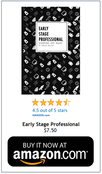- Wise Words -
*Stage Fright.
How I Took the Panic Out of Presenting
*writer opted for anonymity

I never used to get anxious when presenting to an audience. I used to be calm about the prospect of doing it and a big part of me enjoyed presenting on a project, an idea, a team success, whatever. For me it was part of business life and I felt I did it well. This changed for me mid-career when I presented at an offsite when I was about six weeks into a new role. I got up to go through my five slides of PowerPoint in front of the whole company and BOOM I had nerves.
When I say nerves, what I mean is that I got a racing heart, my hands started to shake (so I put them in my pocket), my voiced dried up (I made a joke about being hungover from the night before and just gulped some water) and these were the easy bits of my stage fright. The difficult bit was that my mind started to race and I remember thinking “you are getting this wrong, you don’t know what you are talking about” as I stood in front of 100 people. It was such a strange feeling to be up on stage questioning myself while also talking and getting my message out there. What was also strange was the reception to my presentation. Despite me feeling that I had no right to be there, my presentation had come across well. I had engaged with my audience. My manager was pleased with my work and my team looked happy with how I had represented them. Phew. Presentation panic over? Nope! Despite me doing a decent job and no one picking up on my nerves it was the beginning of a five-year project to getting back to presenting from a position of calm. My way back I am not here to say why having my fright was a bad thing (trust me, it is no fun at all), but instead I want to talk about how I coped with it and got “back” to presenting in a calm way. My goal in writing this column is to go through the actions that helped me in the event that it is useful to other people struggling with presenting to an audience. Here’s what I did: Being open about my nerves: Ok as I am writing this without my name at the top of the page, I am clearly not comfortable with being totally open about this topic. That said, having those trusted work colleagues and friends was a huge support to me. I remember one person who picked up on my nerves saying in the morning before a company-wide presentation “If you get nerves today just look over at me. I will be cheering you on”. This was back in 2014 and I still remember it to this day. It did help me steady myself when my nerves started to rise. I also found it amazingly helpful talking to friends about how I felt about presenting and the strange dip in my confidence. What was amazing was how many people said they were going through the same thing. While I was sad to hear that people who I liked and respected were in the same boat as me, it gave me comfort and a support network. We shared tips on what we did to get through the idea of presenting. We built each other up. We challenged each other; “You are a great presenter, what are you talking about?”. Being open and getting support was the beginning. Preparation: I used to be able to wing it and turn up to a crowd and present on an idea. I had done this with CEOs of billion-dollar companies, clients, you name it. I had always known what I wanted to say so the work part was prepared but I never really ran through my lines ahead of time. This changed as I addressed my stage fright. Preparing in detail by running through a presentation multiple times is a common idea and one friend said it had been helpful to her so I gave it a shot. The reason, so the theory goes, is that if we are prepared our brain can just roll through the presentation in more of an autopilot way. Not great as you still feel the anxiety, but good as you get through the presentation and the audience may not even know of your inner turmoil! Mental exercise: This was crucial to me and went something like “I know what I am talking about and I am presenting to friends. My audience supports me”. This is now part of my prep. If I think I am presenting to a friendly audience which in the main I am, it tricks my brain to calm a little. As well as telling myself that I have a friendly audience, I now go a further. I tell myself that I know my stuff and that I will be good. I take pressure off myself by not saying I will be great. With good-ness I know that I have an achievable goal and this puts me at ease. Caffeine: I love coffee. I probably drink too much of it. Normally this doesn’t matter, but in terms of managing my feelings when presenting it is really unhelpful. The reason for that is that caffeine is a stimulant which, combined with natural adrenaline can heighten any shakes and/or racing heart. It took me a while to figure this out (duh!), but I do remember presenting a month after my first stage fright episode and having had about four espressos, getting the shakes when presenting. Cue more hands in pockets. Cue, cutting out coffee and other caffeinated drinks for a couple of hours ahead of presenting. Water is a fabulous alternative and is good for your skin to boot! Deep breaths: This is something I stole when I googled “how to deal with fear over public speaking” and have to say I have found invaluable. The theory behind it is that taking a deep breath tricks your brain. It calms it down. Regardless of the theory it works for me and isn’t too dramatic thing to do even in front of people. It just looks like I am breathing! Exercise: This is one that I view as a nice to have as during the workday I have a pretty packed meeting schedule. What I try to do, though is take a brisk walk around the block. Again, this came from doing some web research on ideas for overcoming my stage anxiety and the reason why this seems to work is if you give your heart a bit of a workout it will be less prone to race when in a position of stress, aka "on the stage"! Some people I have spoken to said jumping jacks were also a nice way of achieving this although I find this a bit too much and can’t seem to find a place to do it in an open plan office. Standing on stage as the audience comes in: If I can, I will stand at the front of the room ahead of time so that I can see everyone, smile at them and just get used to being on stage. It is not always possible to do this, but I find that if I can, my nerves are able to come and go while I am not presenting, just smiling. I can then present without the nerves getting in the way. Reading on the topic. So, a lot of what I write above is based on research that I have done myself and then adapted for me. One book I would recommend reading that is exceptionally accessible is from all the way back to 1962 but still stands today: The Quick and Easy Way to Effective Public Speaking by Dale Carnegie. I would so recommend taking a read and for me spending time reflecting on the ideas in this book probably represented my turning point. There were actionable strategies and examples of how and where people run into issues and navigate out of them. Oh and as it’s such an old book, it’s a steal of an Amazon Kindle purchase (I think it cost me $1.99). Keep on keeping on. I am saving the most important bit for last. Sure, I didn’t volunteer to speak all the time (I am not that much of a sucker for punishment) but I did every presentation that I was asked to. I put in place as best I could all the prep that I talked about earlier. It was by keeping on practicing that my brain was able to get used to being on stage and also by getting a little better at every “show” my confidence grew and my fear subsided. So that’s how I got back to it and then it fell apart…! So why am I writing today? For one, I just completed a webinar that was a bit of a shocker. Not because I fluffed my lines, but because the tech was up and down (am writing this column in the time of Covid-19 and the internet was overwhelmed with all the home workers). During the webinar I lost connection with the audience and only re-joined five minutes later when I figured out it had dropped. Even when I got back on, it wasn’t a great experience for users as my slides were delayed and it felt a bit out of synch. I am glad it happened though. Not just so I could write about it here, but also because the experience of being part of a “rocky horror show” was very, very helpful. When we think about the many reasons why we could get presentation panic, failing and looking like an idiot can be the biggest reason why we get anxious. Despite the technical difficulties and me feeling like I had merely gotten through it, the feedback I got was amazing. “You were so calm. We could do with some calm right now” was a piece of memorable (and comforting!) feedback. How I coped with the difficulties was seen as a strength rather than a weakness. This made me want to write this column. For the time being at least I feel that after five years of working through this, I am on the other side of the issue. I feel effective and relaxed again. I honestly don’t know if my nerves have been cured for the long term or if this is just a pause for them, but today I don’t care. I am just glad to be where I am! My hope is that my story is useful if you or someone else know who is working through the pain of presentation panic and provides some ideas for overcoming it and at the very least knowing that there are many, many people who suffer from it. === Related columns on Early Stage Professional: “Business Reports & Presentations. An Overview”, "The Office as Stage" Further reading: The Quick and Easy Way to Effective Public Speaking by Dale Carnegie.
|


